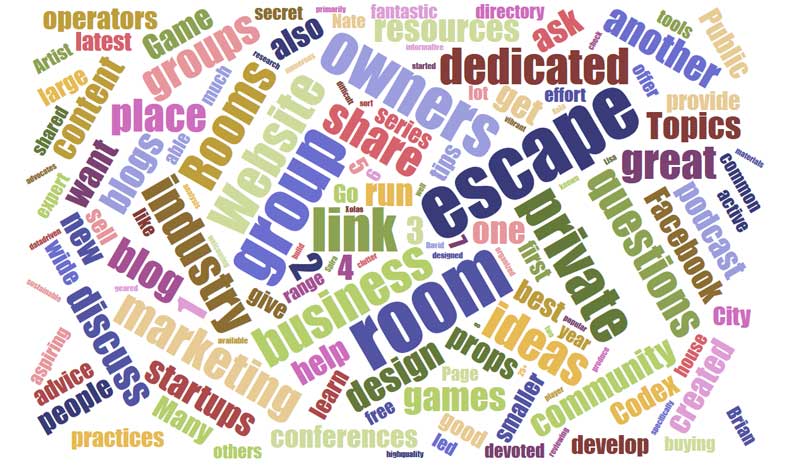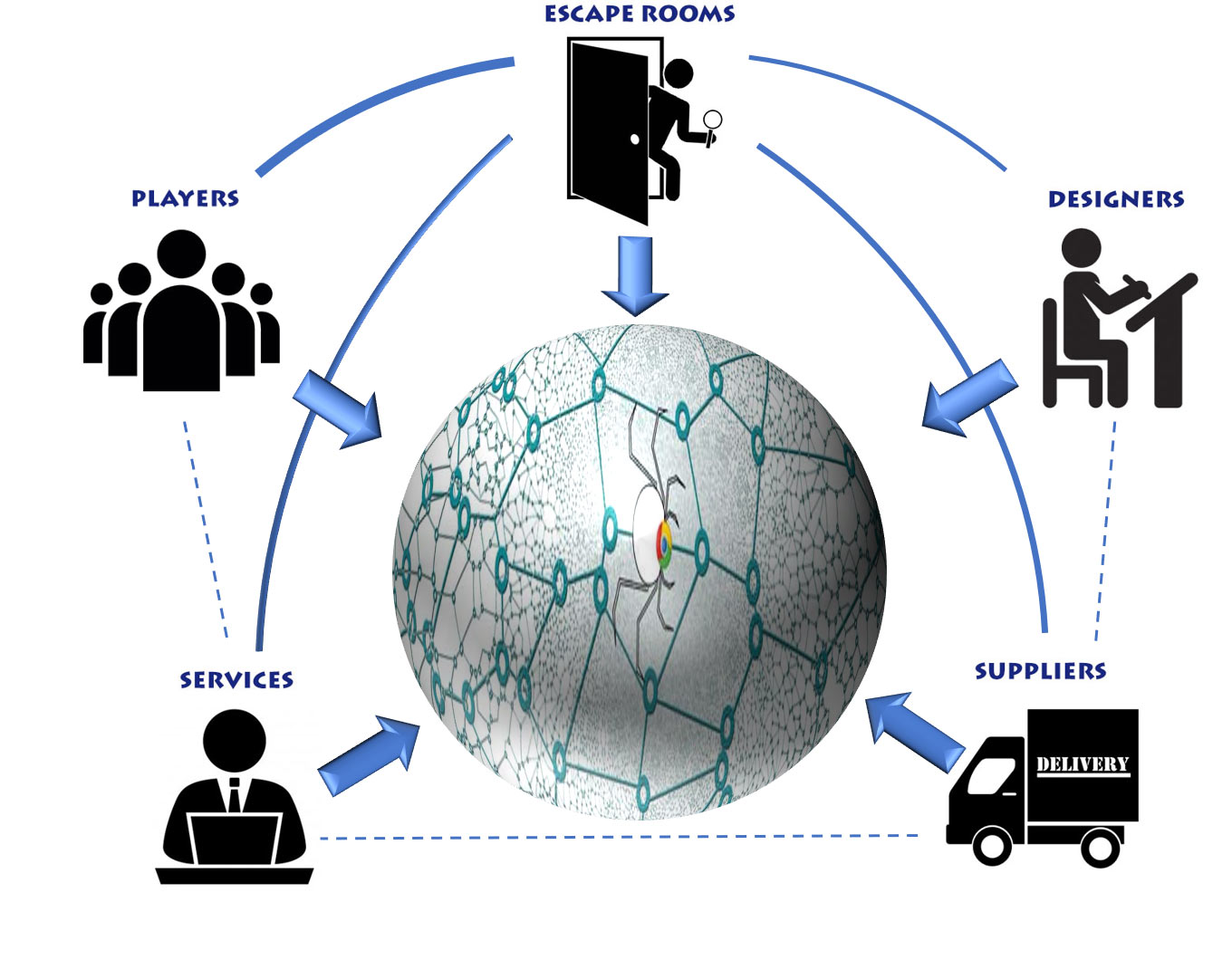
Why We Need Sites that Facilitate Community Interaction
The majority of businesses and websites focus on a particular market segment or niche which typically represents a small section of an industry. This is no different for the escape room industry. The reason for this is quite clear – to limit the amount of competition by identifying needs or wants that are not being addressed by competitors. A potential problem is that, depending on the size of the industry, thousands of sites are created in cellular fashion competing for consumer attention via search engine optimization and hoping they rise to the top of search engines to be recognized by prospective customers. Community interation can be non-existent or very limited.
LACK OF COMMUNITY INTERACTION – AN ILLUSTRATION
Another problem is the lack of group interaction, communication, and integration between the various segments or roles within an industry. I will illustrate using an example that many can relate to. Imagine four individuals on a project: Will, Max, Robin, and Mary. Will picks up the phone and calls Mary for some information. At a later time, Mary emails Max for some information that she needs. At some point Max walks over to Robin’s desk to discuss something. None of the party members are aware of the other conversations, and oh by the way, the scope of the project changes or increases over time. What are the chances that they are all on the same page and how frustrating might things be?
Now image we add a fifth member, Stephen, who becomes the new project lead (apparently the previous lead was not doing their job!). He recognizes the need to facilitate communication between Will, Max, Robin, and Mary. They all meet together to discuss their problems and needs. Using their skills, experience, and diverse perspectives they work together to solve problems and achieve their goals. They have information in one place and change their practice of communicating so that all are aware of the latest information.
INDUSTRY AFFECTS
While this illustration may seem dramatic, the affects at the industry level regarding the lack of community interaction can be lack of information and resources resulting in increased expenses, lost time and revenue, and potentially failure of businesses. A secondary impact can be loss of or reduction of quality in products and services. In the virtual world of the internet, a potential solution to this problem is via the implementation of sites that bring the segments of an industry together. The sites would identify key segments or roles, have some rudimentary knowledge of linkages or relationships between the segments, and implement a site infrastructure to facilitate problem identification or needs and the solutions (e.g., information, products, and services) to solve the problems and meet community needs.
EXAMPLES FROM ESCAPE ROOM OWNERS
Let’s further examine this issue for the Escape Room Industry. Brief research shows some examples of the problem:
“The industry remains very fragmented. … This highly fragmented market produces a wide range of product experiences. … In short, the industry is sprawling. Many have figured out a sometimes unique path to profitability in the space, but nobody has a clear winning model. What happens next is unclear. “[source]
EscapeFront.com ran two blog articles [source1, source2] documenting the feedback from 70 escape room businesses they received that illustrates the lack of disseminating information leading to struggles with creation of an escape room business. Business owner feedback included the following statements:
“Especially in the relatively new escape room industry, where there are so many uncharted waters. There’s no rulebook, no universally-accepted best practices, and very little industry data available to help light your path to success. You know this.”
“The truth is, to start an escape room business, you have to be incredibly brave. It’s a risky business to get into but also very lucrative IF you do your homework.”
“I wish I knew literally every step of the construction process would take triple the time you think it’s going to take.”
“How much time is needed to learn everything and I mean everything!!! Learning not only how to build out a room, puzzles, marketing, which software to use for bookings, escape room manager, cameras, microphones, bookkeeping, etc. etc. etc!!!!!!!”
“Every little detail looks from the outside like it is very easy and a lot of times cheap. But in reality, is extremely time-consuming and expensive.”
“There is always more to do, more ways to improve, new things to tweak and focus on, and new problems to solve.”
These quotes should not dissolution anyone into deciding against becoming an owner, but rather to convey that dissemination of information is the key to success. This is where the community has the opportunity to take an active role in providing their experiences, both failures and successes, so that we can all learn, have a more consistent industry, and improve the quality of the gaming experience. There are hundreds of details to tackle and we would like to minimize escape room owners working overtime in figuring out these details.
POSSIBLE SOLUTION
So how does one provide a framework for enhancing and facilitating relevant information via community interaction? Let’s look at an example of what the segments/roles and relationships of the escape room industry might look like:
Five segments are represented: 1) Escape Rooms, 2) Players, 3) Designers, 4) Suppliers, and 5) Services. Players have at least two roles: 1) The obvious role where they play escape rooms, and 2) Many are likely interested in beta-testing new rooms and/or setting up temporary rooms (e.g., fund raisers). Designers can provide designs for brick and mortar escape rooms, mobile rooms, and temporary rooms for charities and parties. Type of services include construction, consulting, booking services, etc.
The strength of the relationships is represented by the lines. The heavier the line, the stronger the relationship. The dashed line indicates uncertainty of a relationship. Relationships can be formed with or with the internet, though the internet search engines or social media may have played some role in leading to the formation of the relationship. The actual relationships are more intricate than what is represented here, but this illustration provides for an initial framework that can be revised as community knowledge is collected and disseminated.
In providing a site infrastructure, it is important to consider the ways in which people collect information and communicate. Multiple methods can be employed. A directory can be implemented to capture and identify individuals and business that represent these segments with an available communication channel from the individuals seeking help. If the needed information cannot be located there, a forum could be available to allow these individuals to communicate their needs. Certainly the site providing this infrastructure should have a mechanism in place so that individuals can communicate their needs to the site and that the site, in turn, can reach out to the community.
From a business perspective, one challenge for such a site is that it won’t be employing a niche unless one considers the involvement of all industry segments a niche in itself. The site should not ignore perceived “competitors” but instead embrace the entire community allowing all to participate. Not doing so could be equivalent to having a puzzle with missing pieces while thinking one has an adequate picture of how the industry functions and interacts.
CONCLUDING REMARKS
All industries, including the escape room inductry, can benefit by providing and receiving information through community interaction while being able to advertise their businesses. These sites wouldn’t replace the need for search engines or social media, but could supplement them in a broader realm in integrated fashion while providing more relevant information. It cannot be over-emphasized that success or failure of these facilitator sites will be highly dependent on the community and their involvement to provide knowledge and experiences. Successful facilitator sites may be key to ensuring continued growth and success of the escape room industry particularly as the industry matures out of the initial growth phase.
Do you think there is a lack of interaction on the internet? Do you think there would be a benefit of such sites or do you think it wouldn’t matter? Please comment below (must be logged into your account) and let us know your thoughts!




